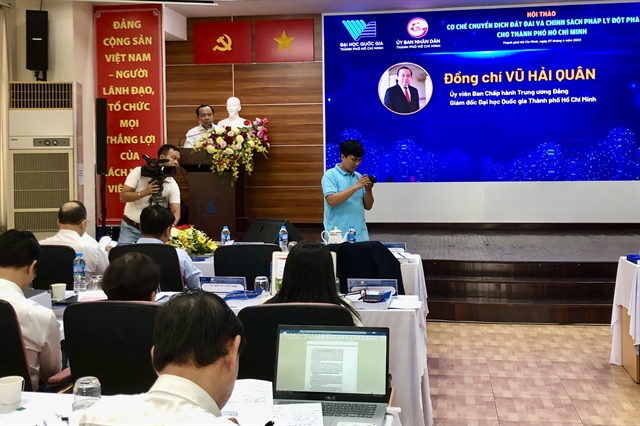 Society
Society


|
| A workshop was held in HCM City to discuss breakthrough policies and specific mechanisms on land conversion to meet requirements for sustainable development. — VNS Photo Nguyễn Diệp |
HCM CITY — HCM City needs to implement breakthrough policies and specific mechanisms on land conversion to meet requirements and ensure sustainable development goals.
That was the message from experts speaking at a recent workshop in the city.
The workshop, titled “Specific mechanisms on land conversion and breakthrough policies for HCM City” discussed policies related to land in line with the city’s growth. It was co-organised last week by the municipal People’s Committee and Việt Nam National University-HCM City (VNU-HCM).
It held a forum for scientists, policy makers and relevant agencies to exchange, discuss and comment on the draft Land Law (amended), including regulations on land for public non-business units.
Speaking at the workshop, chairman of the municipal People’s Committee Phan Văn Mãi said land plays an important role, and is a decisive resource and an input factor, in the city's development process, affecting the process of industrialisation and modernisation in the country.
The right conversion of land use purposes will bring great value, ensuring the harmonisation of rights and interests of the State, land users, and investors.
However, the city’s land use and management still have many limitations and problems due to overlapping and inconsistent policies and laws related to land, he said.
The city has researched and contributed to amending the draft Land Law, which has revealed obstacles hindering the business activities of enterprises, and proposed breakthrough mechanisms on land.
According to inspections conducted last year, land use efficiency in the city remains low, with a high number of land-related complaints, denunciations and acquisitions.
More than 65 per cent of opinions, recommendations, reflections, complaints and denunciations in the first six months of 2022 were related to the land sector.
The city now has a lot of land areas with favourable conditions that have not been effectively exploited and used, causing waste.
The conversion of land use purposes from agriculture to non-agriculture in the period 2016-20 only reached 13.2 per cent.
The slow conversion has significantly affected socio-economic development, causing stagnation in the city’s infrastructure development and the entire urbanisation process.
It is also necessary to have solutions to remove obstacles in the bidding process of projects, mechanisms to ensure the land use rights of investors, and mechanisms to transfer real estate business projects, Mãi added.
The Vietnam Chamber of Commerce and Industry (VCCI) has also surveyed business opinions on the matter.
The survey showed 50 per cent of businesses have difficulties with procedures for land and site clearance, 48 per cent have problems with construction planning, and more than 40 per cent have issues with appraisal and approval procedures.
There are several significant problems, such as limited access to and accumulation of land, unfeasible capital contributions with land use rights, and inadequacies in land use rights.
Land valuation and administrative procedures are too troublesome for most businesses, mainly small and medium-sized ones, which account for more than 80 per cent of the enterprises in the country.
Vũ Hải Quân, director of VNU-HCM, said the current Land Law is not suitable to rapid and sustainable socio-economic development, leading to a high rate of land-related complaints and denunciations.
Therefore, it is urgent to amend the provisions of the draft Land Law in order to remove legal obstacles in the development of the real estate market.
In addition, the amendment also needs to develop a transparent real estate market, and ensure better efficiency in land use and management.
Trương Minh Huy Vũ, deputy director of the city’s Development Research Institute, said land conversion is a cross-cutting issue in the urban development and modernisation process.
For example, in order to develop the public transport system, including the metro line No. 1 project, the city has to solve problems such as creating a clean land fund around the project.
From planning the land fund, the city will develop an auction and bidding mechanism, thereby developing the urban economy.
Trương Trọng Hiểu of the University of Economics-Law under VNU-HCM, said it is necessary to allow the city to separate compensation, support, resettlement and site clearance projects from public investment projects.
The municipal People's Committee will decide to invest in or adjust the compensation, support, resettlement and site clearance projects approved by the city’s People's Council City.
All comments at the workshop were collected and reported to the competent authorities. — VNS




